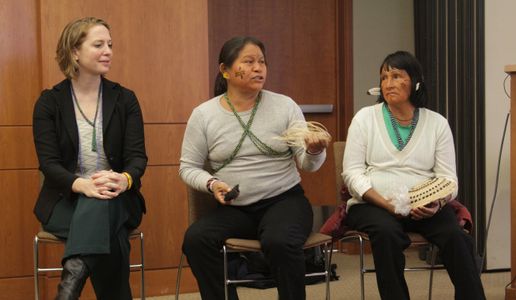Yanomami Discuss Grassroots Leadership in the Amazon

The Frederick S. Pardee School of Global Studies at Boston University hosted members of the Yanomami, a linguistic family of approximately 30,000 people in Brazil and Venezuela, on December 4, 2017 for conversations about women’s leadership in sustainable development in the Amazon.
Floriza da Cruz Pinto, a Yanomami indigenous woman native to Maturacá village who is the founder and current president of the Yanomami women’s organization Kumirayoma that represents communities located along the Cauaburis River, and Maria de Jesus Lima, a Yanomami indigenous woman native to Maturacá village who is a senior member of the council of elders of Kumirayoma, were hosted by the Pardee School for several discussions throughout the day.
Da Cruz Pinto and de Jesus Lima were joined by Marina Vieira, a biologist and consultant with the Pro-Yanomami campaign within the NGO Instituto Socioambiental, for a panel entitled “Women’s Leadership in Sustainable Development: A Conversation With Indigenous Leaders and NGO Activists From the Brazilian Amazon.” The discussion was moderated and translated in part from Portuguese by Klinger.
“Today the paradise where we live is under threat. There are threats coming from many different directions, including from the Brazilian government. The government has all of these laws, but the purpose of the laws is supposedly to protect the people who are born, live and die there. The government itself is undermining its own laws,” da Cruz Pinto said.
The Beyond the Headlines @BUPardeeSchool, or BtH, series at the Pardee School continued with a conversation with international award-winning science journalist Marcelo Leite on environmental and scientific journalism in the Amazon during perilous times. Leite is a science reporter and columnist for one of Brazil’s most prominent newspapers, Folha de São Paulo. He writes on scientific, environmental, and related political topics in Brazil and internationally. The conversation was moderated by Klinger.
Leite said he believes science journalism, and specifically journalism focusing on the Amazon region, is socially relevant not only for Brazil but for the world because of importance of global issues like carbon sequestration and climate change. He discussed in detail a story he worked on focusing on the Yaripo Ecotourism Project — a new initiative by the Yanomami that provides guided expeditions to Pico da Neblina, the highest point in Brazil.
Leite and Vieira subsequently joined da Cruz Pinto and de Jesus Lima for a discussion entitled “Grassroots Leaders Forum: Sustainable Development in the Amazon,” which was moderated by Klinger.
“The government doesn’t provide basic health or education assistance like its supposed to according to the law,” da Cruz Pinto said. “If you travel outside our territory and read the newspapers, you get the story that they are in fact providing this health and education assistance when they are not. When you read in the newspapers that the government is doing all of these things to protect indigenous people, these are in fact lies.”
De Jesus Lima and da Cruz Pinto were also hosted as part of the the Policy Leaders Forum series at the Pardee School that brings senior international policy makers to Boston University for important policy conversations with faculty and students. Guests included faculty and experts from across Boston University. Previous speakers in the series have included Senator Daniel Coats, the United States Director for National Intelligence; Dr. Rukakana Rugunda, Prime Minister of Uganda; Steve Beshear, the former Governor of Kentucky; Dr. Woo Yoon-keun, Secretary General on the National Assembly of South Korea; and Senator Sheldon Whitehouse (D-RI).